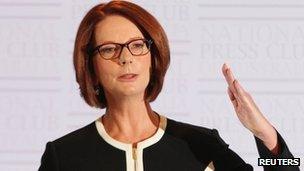Gillard gambles on politics of surprise
- Published

Julia Gillard began the political year with a January surprise.
In unexpectedly setting the date for the forthcoming election eight months ahead of time - Australia will go to the polls on Saturday 14 September - she said her intention was to bring certainty to the electoral calendar. Simultaneously, she was also trying to sow uncertainty, and make its outcome harder to predict.
Already a minority in parliament, her governing Labor party is widely expected not merely to lose the election, but to suffer an overwhelming defeat to the conservative coalition led by Tony Abbott.
The announcement - delivered during a speech to the National Press Club in Canberra and which caught the parliamentary press gallery largely unawares - was meant, then, as a "game changer", the kind of audacious move that disrupts the conventional wisdom and completely upends the dynamics of a race. Ms Gillard even looked different, sporting new glasses for the first time in public.
Tainted by scandal
Even on the day, however, it seemed that little had changed. For all the talk of an eight-month campaign - "something approaching a national pregnancy" in the vivid words of Tony Wright of the Melbourne Age - it felt very much like the continuation of a permanent campaign waged since the 2010 election failed to produce a clear winner.
Eight months is a long time in Australian politics - wearisomely long, in the view of many already bored voters. Worryingly for the government, however, the last six days have only reinforced the political status quo.
Within 24 hours, fraud detectives had arrested Craig Thomson, the one-time Labor MP accused of misusing a union credit to pay for prostitutes and lavish entertainment. Beforehand, presumably to maximise his public humiliation, the police had tipped off the media, forcing him to make a "perp walk" before the cameras.
They also subjected him to a strip search, according to his lawyer. Last year, the prime minister sought to inoculate herself from the scandal by suspending his Labor party membership and forcing him to sit as an independent MP. But the government is tainted by the scandal, not least because she had defended him when her slim parliamentary majority hinged on his survival.
Within 48 hours, Kevin Rudd had also revived his breakfast television sparring partnership with the Shadow Treasurer Joe Hockey - a popular segment on Channel Seven's Sunrise show that helped propel him to the Labor leadership in 2006. If not evidence that a fresh leadership challenge is in the works - the former prime minister, beaten by 71 to 31 votes in last February's leadership vote, still does not have enough support among parliamentary colleagues - it was a reminder that Mr Rudd remains more popular than the woman who ousted him.
Within 72 hours of the announcement, two senior members of the cabinet, the Attorney General Nicola Roxon and the tertiary education minister Chris Evans, announced they were stepping down. The news, announced in a Saturday morning press conference, was not as destabilising as some commentary suggested. It did not "rock" the government. But the timing of the resignations did seem strange, especially given that Julia Gillard had first learnt of Mr Evans' intention to leave parliament at the next election 12 months beforehand.
By late Sunday night, Twitter, and its #auspol hashtag, was already awash with the details of a fresh poll which suggested a 6% slump in government support. Polls in Australia have been elevated into news events, and this one led the Monday morning news bulletins. The first public opinion survey since her election announcement, it also showed that Mr Abbott is closing the personal popularity gap with the prime minister, one of the few advantages that Ms Gillard has left.
Frozen smile
So at a time when the prime minister tried to set the agenda, and more strongly assert her leadership, she once again seemed hostage to events. What should have been a popular move, her selection of the Aboriginal Olympian Nova Peris as a Senate candidate in the Northern Territory, backfired when supporters of the incumbent, Trish Crossin, reacted angrily.
Extraordinary details from a corruption hearing in Sydney, centred on the former New South Wales Labor powerbroker Eddie Obeid, who is accused of defrauding taxpayers of millions of dollars, are also causing untold damage to the party's brand, especially in the country's most populous state.
Even a routine event welcoming the touring West Indies cricket team to Canberra created a mild flap, when her partner, the "First Bloke" and men's health ambassador Tim Matheson, suggested men having prostate examinations should ideally find "a small Asian female doctor".
Seemingly, the prime minister, who reacted to her partner's remarks with a frozen smile, cannot catch a break.
All this comes as the famously abrasive opposition leader, Tony Abbott, is trying to present a new political persona as "the adult in the room". The Liberals have also released a 52-page mini-manifesto, "Real Solutions for All Australians," intended to counter criticism that it offers only negativism and obstructionism.
The job of mounting daily attacks on the government will also rest more on the shoulders of his deputy Julie Bishop and Christopher Pyne, the aptly named "manager of opposition business".
In yet another reminder of how squalid political debate in Australia has become, Mr Pyne has already had to retract comments made on Sunday that "the government is starting to resemble a scene from Downfall", a film about the last days of Hitler.
Clearly it will take more than a January surprise to produce a surprise in September.
- Published2 February 2013
- Published30 January 2013
- Published31 January 2013
- Published24 December 2012
- Published19 April 2016